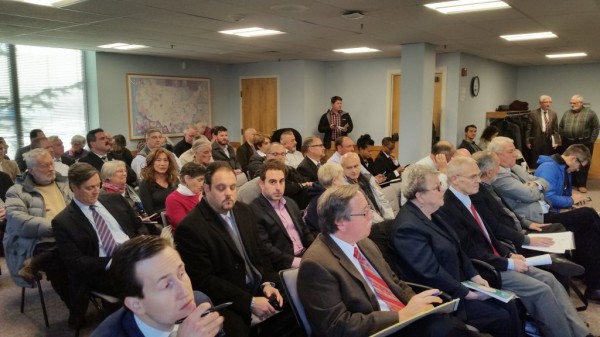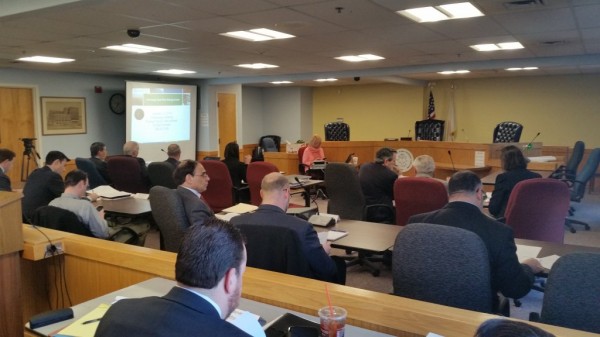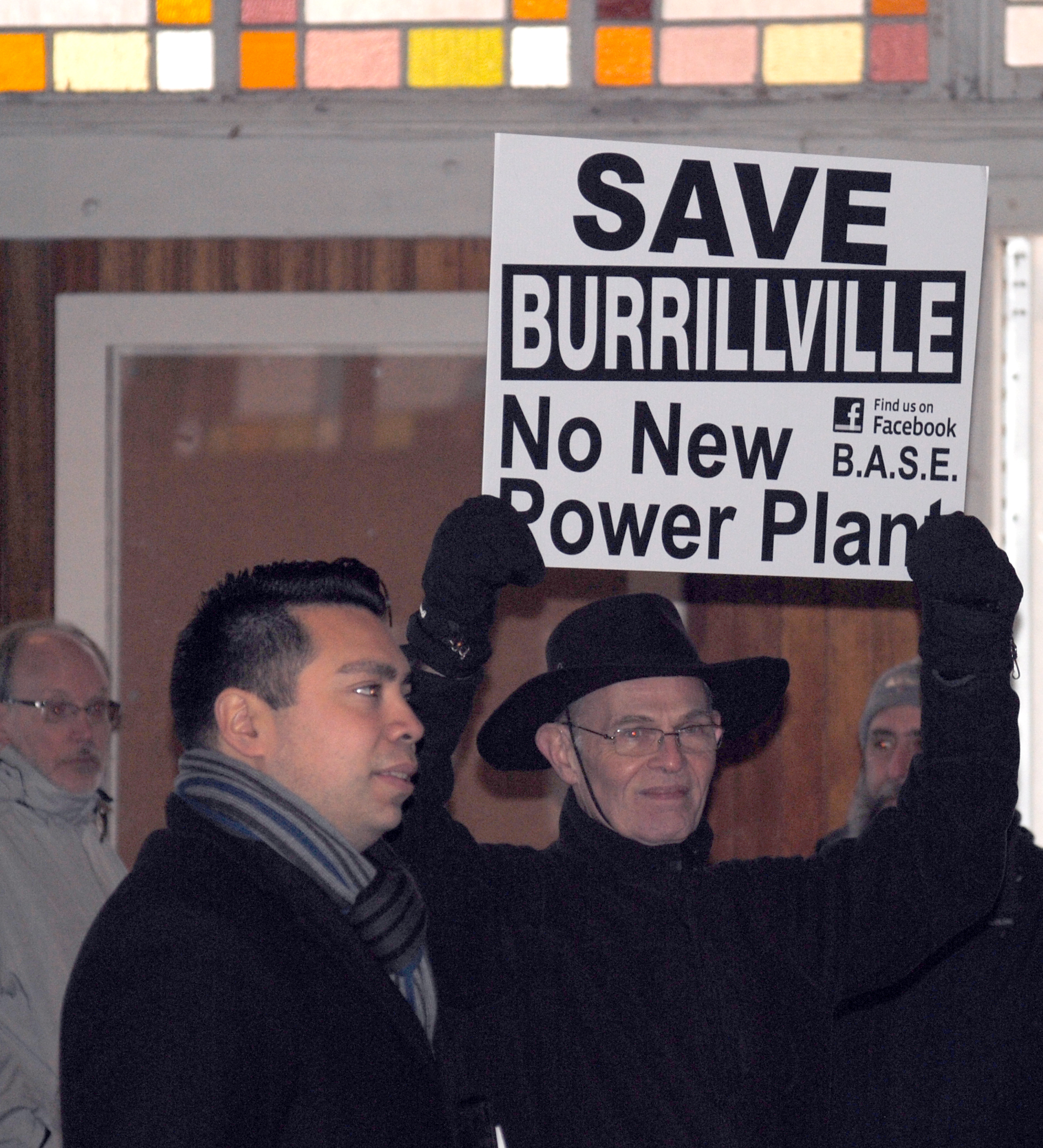 The new methane gas power plant planned by Invenergy for the Town of Burrillville met strong opposition from a variety of environmental groups but also had what seemed like strong support from both members of the Energy Facilities Siting Board (EFSB) which will ultimately approve or deny the application. The EFSB is chaired by RI Public Utilities Commission (RIPUC) Chairperson Margaret Curran and has only one other sitting member, Janet Coit, director of the Department of Environmental Management (DEM). The third position on the board is usually filled by the associate director of the RI Administration for Planning, a position currently unfilled, but it is expected that Governor Gina Raimondo will choose someone to fill that role soon.
The new methane gas power plant planned by Invenergy for the Town of Burrillville met strong opposition from a variety of environmental groups but also had what seemed like strong support from both members of the Energy Facilities Siting Board (EFSB) which will ultimately approve or deny the application. The EFSB is chaired by RI Public Utilities Commission (RIPUC) Chairperson Margaret Curran and has only one other sitting member, Janet Coit, director of the Department of Environmental Management (DEM). The third position on the board is usually filled by the associate director of the RI Administration for Planning, a position currently unfilled, but it is expected that Governor Gina Raimondo will choose someone to fill that role soon.
As the standing room only hearing got under way, Chairperson Curran noted that there hasn’t been a hearing like this since 1999, the last time an energy project of this size was considered. No public comment was allowed at this meeting, but Curran said that there were three public comment meetings scheduled. (It turns out they have not been scheduled at the time of this writing.)
Board member Coit spent some time near the beginning of the hearing informing the room that her position as head of the DEM will not impact her decisions as an EFSB board member. The duties of the DEM in deciding on key aspects of Invenergy’s proposed power plant have been delegated to her assistant, Terry Gray, and Coit says she is firewalling herself from her department’s work in this area. Some activists in the room expressed doubt in the possibility of such a firewall. It should be noted that Governor Gina Raimondo nominates all three EFSB board positions and that she has publicly backed Invenergy’s plan.
The two member board’s first order of business was to deal with an unprecedented number of motions for intervention, which if granted, would allow standing in these hearings for several groups and individuals. Invenergy objected to many of the motions, but did not object to allowing intervenor status for the Conservation Law Foundation (CLF), the Burrillville Land Trust (BLT), The RI Department of Energy Resources, the RI Building Trades Council and National Grid. The board granted all but the Burrillville Land Trust intervenor status, and said that the decisions on the rest of the motions for intervention would be announced at a January 29 meeting.
One motion immediately granted to Invenergy allowed the company to keep certain “proprietary” financial information secret from the public. Between this and Invenergy’s eagerness to deny intervenor status, it becomes difficult to believe the company is truly committed to an open, public process.
I covered Invenergy’s objections to granting intervene status here. Since then the Building Trades filed for last minute intervenor status because their union would represent the vast majority of workers who will build the plant if approved. The Building Trades were granted limited intervenor status pertaining to employment.
Both the Conservation Law Foundation and the Burrillville Land Trust had motions before the board asking that Invenergy’s application be denied. BLT said bluntly that the Invenergy application contains erroneous information or deliberate omissions. There are, says BLT, no biodiversity impacts and no noise impacts cited in Invenergy’s application. BLT maintains that Invenergy underestimated the impact of their power plant on species diversity by half. The effects on birds and bats, so important to keep insect populations down, is likely to be severe. Invenergy’s estimated water impacts are 75% less than what BLT expects. Ultimately, says the BLT, the impact of this power plant will be felt for decades after its estimated 40-50 life span.
The CLF’s motion to dismiss was based in part on the Resilient Rhode Island Act, and on the fact that Invenergy’s application is incomplete. Under the law, says CLF attorney Jerry Elmer, “Incomplete applications must be rejected.”
Invenergy could not argue that their application was complete. They even admitted that they are still in negotiation for some permits. But Invenergy maintained that this is business as usual and not a reason to reject the application. Invenergy is pushing hard on this application, and want the EFSB to make a quick decision because if this application process drags on too long, they could be out hundreds of millions of dollars, said the CLF. But Attorney Elmer said that Invernergy needs to live with their business decisions, and the EFSB must deny incomplete objections even if Invenergy might face a monetary loss.
Chairperson Curran argued for Invenergy’s position, it seems to me, better than Invenergy’s own lawyers. Curran said that she thinks incomplete applications can move ahead despite what the CLF sees as important, material omissions. The application, says Curran, will be finished by the time the EFSB makes a decision, but Attorney Elmer countered that the statute and rules say that the application must be complete when filed, not when decided upon.

Board member Coit also argued passionately for Invenergy’s position. If Curran and Coit want to obey the law though, it would seem that they might have to reject Invenergy’s application, something they clearly didn’t want to do.
Invenergy’s lawyers were clearly pleased with Curran and Coit’s defense of their application. They assured the EFSB board that the board will have plenty of information about the power plant by the time they make their decision. The lawyers maintained that what isn’t in the application isn’t important. In fact, in all their years of practice, these lawyers say they have, “never seen such a detailed application.”
The CLF was next questioned about their reliance on the Resilient RI Act. Under the law, all state agencies shall follow this act. This means that the act applies to the EFSB and that the EFSB has the discretion to consider the climate change impact of the proposed energy plant.
Invenergy seems to feel that the Resilient RI Act is a toothless reminder about the importance of greenhouse gas reductions. They said that the act says nothing about their project and really doesn’t apply.
The second half of the hearing consisted of Invenergy’s sales pitch, a 51 page PowerPoint presentation that is both an ad for Invenergy (including slides touting the companies wind and solar projects, projects they seem to have no interest in bringing to Rhode Island) and plenty of information about the robustness of the company’s finances.


